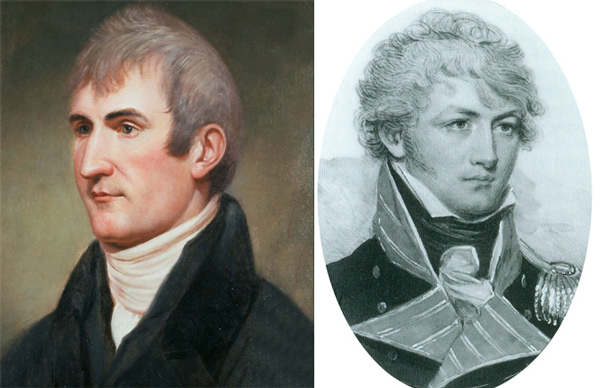In Pittsburgh, Meriwether Lewis recommends Lt. Moses Hooke—the commander of Fort Fayette—to co-lead the Western Expedition should William Clark decline.
Lewis and Hooke
Lewis: by Charles Willson Peale, courtesy WikiCommons. Hooke: courtesy of Louisiana State University Art Museum.
Pittsburgh July 26th. 1803.
Dear Sir [Thomas Jefferson],
I have recieved as yet no answer from Mr. Clark . . . . Should I recieve no answer from Mr. Clark previous to my leaving this place, or he decline going with me, I would be much gratifyed with being authorized to take Lieut. Hooke with me . . . .
. . . . .
If Lieut Hooke sets out twenty days after me, by taking the rout of Limestone, Louisville and Vincennes he will reach the mouth of the Missourie as early as I shall.
I am with the most sincere attatchment Your Obt. Servt.
Meriwether Lewis[1]Lewis to Jefferson, Founders Online, National Archives, founders.archives.gov/documents/Jefferson/01-41-02-0082 accessed 13 June 2022. [Original source: The Papers of Thomas Jefferson, vol. 41, 11 … Continue reading
Lewis received Clark’s positive reply—written on 18 July 1803 at the Falls of the Ohio—on 29 July 1803.
Experience the Lewis and Clark Trail
The Lewis and Clark Trail Experience—our sister site at lewisandclark.travel—connects the world to people and places on the Lewis and Clark Trail.
Plan a trip related to July 26, 1803:

Notes
| ↑1 | Lewis to Jefferson, Founders Online, National Archives, founders.archives.gov/documents/Jefferson/01-41-02-0082 accessed 13 June 2022. [Original source: The Papers of Thomas Jefferson, vol. 41, 11 July–15 November 1803, ed. Barbara B. Oberg. Princeton: Princeton University Press, 2014, pp. 116–117.] |
|---|

